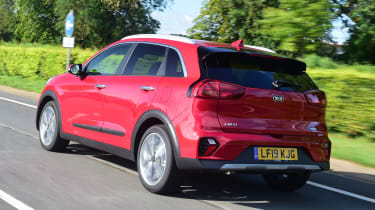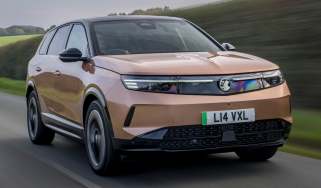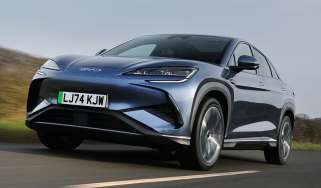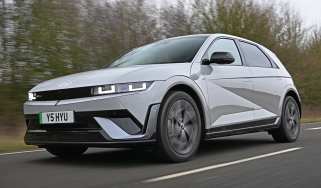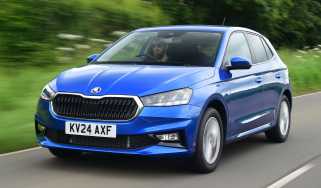Kia Niro SUV review (2016-2022)
"The Kia Niro is a hybrid SUV that’s not quite as frugal as the Toyota Prius, but is practical, easy to drive and highly affordable"
Pros
- Impressive practicality
- Good refinement
- Well equipped
Cons
- Firm ride
- Relatively high list price
- A Prius is more efficient
The Kia Niro is a hugely capable family car – not least because it's spacious, fuel-efficient and loaded with kit. It sits somewhere between a family hatchback and an SUV, and comes with a choice of hybrid, plug-in hybrid and pure-electric powertrains.
That choice of propulsion means it spans a large part of the family car market. It will appeal to buyers looking at petrol or hybrid versions of the Ford Puma, Hyundai Kona and Toyota C-HR, as well as plug-in models of the MINI Countryman and Renault Captur. The pure-electric e-Niro goes up against the new Vauxhall Mokka-e, and Volkswagen ID.3.
Unlike hybrid conversions of petrol and diesel-engined cars, the Niro was intended as an electrified model from the start. This means its electric motor and battery system were integrated into the design from the outset and don't rob it of interior or boot space as is the case in some less thoroughly designed rivals. Its relatively square proportions help to increase the sense of space inside, too; the Niro is a very accommodating family car.
It went through a mid-life refresh in 2019, which updated the car’s design slightly but was mainly about upgrading the technology on board. A bigger 10.25-inch touchscreen was introduced, along with the ability to remotely check on the car via Kia's UVO Connect Services smartphone app.
The Niro hybrid has always been a pretty economical car, and Kia has left its powertrain largely untouched for the facelifted version. Kia claims 58.9mpg for the hybrid model, a figure that can't quite match the Toyota Prius, but is pretty remarkable for such a bulky, practical machine. If its official fuel-efficiency seems lower than before, that's because it's now tested to stricter WLTP standards, which means the quoted figure is much easier to achieve in real life.
Total power output is 139bhp, so don't expect a sparkling drive – 0-62mph takes 11.1 seconds. However, unlike other hybrids that use a continuously variable transmission (CVT), the Niro has a dual-clutch automatic, and this helps it to feel fairly responsive and eager, avoiding the sluggish feel for which CVTs are well known. It gives far fewer cues as to its hybrid nature than most cars of its type to drive.
More reviews
In-depth reviews
The plug-in hybrid feels much the same to drive, but its larger battery pack and electrical hook-up means it can be charged overnight for up to 30 miles of all-electric driving. Some urban commuters will find this sufficient for a trip to work and back and its official fuel consumption figure is 201.8mpg. It's worth noting that you're only likely to realise this figure if you make full use of its electric capabilities and rarely run on petrol, but some will find its 31g/km CO2 emissions figure of far more consequence – it places the Niro PHEV in a low Benefit-in-Kind (BiK) company-car tax band and allows it to enter low emissions zones like the area covered by the London Congestion Charge.
Although forward-thinking design means the Niro's hybrid system steals little interior space, its extra weight has still forced compromises to be made. The suspension is on the stiff side, which prevents the Niro from leaning heavily in bends but also gives it a rather firm ride – made worse by the 18-inch wheels of range-topping versions. The steering is rather inert, too, lacking much in the way of feel. But spirited driving really isn't what the Niro is all about – it's far more at ease providing fuss-free family transport without burning a lot of fuel.
You can choose from 2, 3 and 4 trim levels on the hybrid and 2 and 3 specs on the PHEV. All come with essentials like Bluetooth, alloy wheels, dual-zone climate control, DAB radio, rear parking sensors and LED daytime running lights as standard. There's also an eight-inch touchscreen with Android Auto and Apple CarPlay as standard, allowing you to use your phone and certain apps, such as Google Maps and Spotify, via the screen.
The 3 adds desirable upgrades like a 10.25-inch screen, adaptive cruise control, reversing camera, front parking sensors, satellite navigation with traffic updates, tinted windows, black leather upholstery (heated in the front) and automatic lights and wipers. The 4 gets all the toys, including 18-inch wheels and a sunroof.
The pure-electric Kia e-Niro is also defined as a standalone model in it's own right, though it is available with a choice of batteries and specs. The smaller battery models will officially do 180 miles, while those with the larger battery are capable of 282 miles between charges. That latter figure beats rivals like the Nissan Leaf, as well as premium models like the Audi e-tron and Jaguar I-Pace. As the most high-tech Niro offered, it’s also the most expensive, with the flagship ‘4+’ trim model costing a shade under £40,000.
The Niro has been well received by owners, who ranked it in an impressive second-place overall in our 2021 Driver Power survey. The company's seven-year/100,000-mile warranty is one of the best in the business, too.
This helps to round off a package that might not set the standard in any given area, but makes a very competent, well equipped all-rounder that should be very easy to live with.
An all-new Kia Niro has already been announced, and will arrive later this year. It features bold new design, upgraded technology and a choice of hybrid and electric powertrains.
See how this car scored on our sister site DrivingElectric
Which Is Best?
Cheapest
- Name1.6 GDi 127 Hybrid 2 Nav 5dr DCT
- Gearbox typeAuto
- RRP£30,085
Most Economical
- Name1.6 GDi 168 PHEV 2 5dr DCT
- Gearbox typeAuto
- RRP£35,325
Fastest
- Name1.6 GDi 168 PHEV 2 5dr DCT
- Gearbox typeAuto
- RRP£35,325



